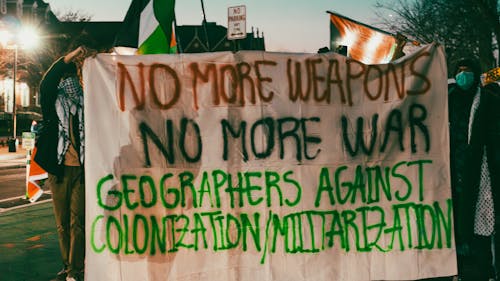COMMENTARY: RUSA unanimously votes for historic divestment referendum

On March 7, the Rutgers University Student Assembly held a closed session after its weekly meeting.
The outcome of the closed session, which lasted two hours, was a unanimous vote on something once considered unprecedented — a referendum to Rutgers—New Brunswick undergraduates which poses two questions:
1: "Should Rutgers, The State University of New Jersey, divest its endowment fund from companies and organizations that profit from, engage in or contribute to the government of Israel's human rights violations?"
2: "Should Rutgers, The State University of New Jersey terminate its partnership with Tel Aviv University, including in the New Jersey Innovation and Technology Hub?"
The questions of the referendum regard the ethicality of the University's endowment in the State of Israel and the companies that support it. At the time of writing, the Israeli government and its policies, both militarily and non-militarily, are responsible for more than 32,300 Palestinians being killed, as well as more than 74,000 injured and more than one million facing starvation.
The explanatory clauses of the resolution cite unethical investments in Rutgers endowments, stating, "$1.88 billion across more than 180 funds at Rutgers University as of 2023, yet poses ethical concerns when its investments endorse contentious causes such as Israeli treasury bonds and corporations deeply implicated in Israeli government's settler-colonialism, apartheid and persecution of Palestinians, including Lockheed Martin, Motorola Solutions, Boeing and General Electric Co."
Rutgers Endowment Justice Collective — a coalition of more than 150 Rutgers organizations dedicated to an ethical endowment fund not invested in fossil fuels, apartheid, war or prisons — brought the resolution for a referendum to the Assembly.
This coalition had previously submitted a divestment request in 2020 regarding fossil fuels, the military-industrial complex, the prison-industrial complex, sweatshop labor and Israeli apartheid.
Of these concerns, Rutgers' Joint Committee on Investments accepted the call for divestment in fossil fuels, granting the coalition its first victory, but disregarded the other ethical injustices as insignificant.
This was not the first time that the administration pushed back against an ethical endowment fund.
In 1984, students established the Rutgers Coalition for Total Divestment, which demanded that the University's endowment fund be divested from South African apartheid. Only after significant student protest did Rutgers heed the call for divestment in 1985, divesting a total of $6.4 million, not accounting for inflation, proving student protest and voice are necessary for administrative action.
Despite overwhelming support for this referendum and mountains of historical evidence proving its necessity, the 2024 resolution has already faced stark opposition.
External organizations have attempted to pressure Jack Ramirez, the undergraduate student body president, to veto the resolution. Heavily undermining the democratic process of the Assembly, these campaigns are very similar to the tactics utilized by outside groups lobbying the U.S. government.
One of these organizations called Israel War Room began an email campaign, in which it accuses the Assembly and sponsors of the bill of being radical student groups and implies they are receiving funding from Hamas. This email campaign encouraged Ramirez to veto the referendum within the allotted 10-day timeframe which ended on March 17.
At a time when tensions are escalating globally, particularly on college campuses, the Assembly was able to agree on one thing unanimously: It is the academic freedom of all students — regardless of the topic — to voice their opinions on an ethically grounded endowment fund that aligns with the University's principles of progress, social mobility and educational equity, as well as their own moral standings.
As of now, Rutgers—New Brunswick is one of the largest universities that asks its undergraduate students to vote on both divestment from companies supporting Israel and cutting ties with Israeli universities.
This act will be considered a historic step, proving that the Assembly is committed to the "social mobility" that our University champions.
It is due to this mobility that Rutgers undergraduates have been granted a golden opportunity to take a step on the greater road to social justice and decide whether they want their endowment fund invested in companies that support the government of Israel in its settler colonialism, apartheid and genocide of Palestine and the Palestinian people.
It would be a great disservice to society if we, the undergraduates, do not take advantage of this moment.
Vote yes to divest between March 25 and 29.
The Endowment Justice Collective is a student-led coalition of Rutgers students, faculty and community organizations advocating for an ethical University endowment fund.
*Columns, cartoons and letters do not necessarily reflect the views of the Targum Publishing Company or its staff.
YOUR VOICE | The Daily Targum welcomes submissions from all readers. Letters to the editor must be between 350 and 600 words. Commentaries must be between 600 and 900 words. All authors must include their name, phone number, class year and college affiliation or department to be considered for publication. Please submit via email to oped@dailytargum.com and eic@dailytargum.com to be considered for publication.



